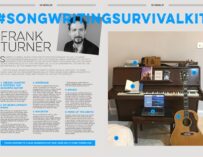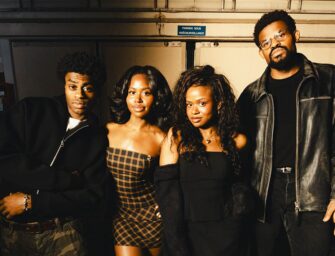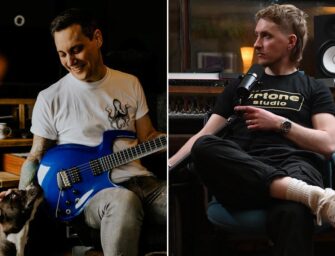
Frank Turner: “It’s quite liberating to think about writing songs about something other than being an asshole”
The post-hardcore singer turned folk troubadour explains his approach to songwriting and evolution from cult status to an arena filler
![]() rancis Edward ‘Frank’ Turner is a folk singer-songwriter from Winchester, who began as the vocalist of post-hardcore band Million Dead, before embarking upon a solo career when the band split-up in 2005. Frank Turner released his debut album, Sleep Is For The Week, in 2007 and has been on an upward curve ever since. He is now a highly regarded performer, a man who plays some of the biggest venues in the UK and whose records reach the higher echelons of the charts.
rancis Edward ‘Frank’ Turner is a folk singer-songwriter from Winchester, who began as the vocalist of post-hardcore band Million Dead, before embarking upon a solo career when the band split-up in 2005. Frank Turner released his debut album, Sleep Is For The Week, in 2007 and has been on an upward curve ever since. He is now a highly regarded performer, a man who plays some of the biggest venues in the UK and whose records reach the higher echelons of the charts.
Positive Songs For Negative People is Frank’s sixth album and the follow-up to 2013’s critically acclaimed Tape Deck Heart. It was made with his trusted backing band The Sleeping Souls and produced by Butch Walker in Nashville. Like much of his work, it is a record that takes Life’s Big Issues – triumphing over the darkest adversities – and places them inside a mix of beguiling, intricate vignettes and sweeping anthems. That it begins with The Angel Islington, a tribute to North London where he now resides, and ends with Song For Josh – a touching eulogy recorded live at the 9.30 Club in Washington – is an apt reflection of the journey Frank Turner has made over the past 10 years.
With Frank in reflective mood, it seemed a perfect moment for Songwriting to speak with the singer-songwriter and look back on his changing fortunes, from a “period of collapse” to “relief and survival”…
What was the moment when you got off the treadmill of touring Tape Deck Heart and started thinking about this album, Positive Songs For Negative People?
“Writing is essentially a continuous process for me – at least it has been for the last decade or so. Technically speaking, the first day of working on this new record, conceptually, was the day after we’d finished mastering Tape Deck Heart and sent it off to the pressing plant. That’s not to say I sat down and started writing songs there and then, but there’s something quite symbolic about that moment when you 100 percent sign off on a record. It always kind of feels like turning a page, and so you’re on to the next thing.

Frank Turner’s Positive Songs For Negative People album cover
“So the theme of the new record was one of relief and survival, it’s like ‘we made it!’ and life goes on and let’s think about other things now. It’s quite liberating to think about writing songs about something other than being an asshole!”
A lot of people think you need to be feeling pain or be in an emotional state in order to write powerful songs. Would you disagree with that?
“Well, these songs aren’t Don’t Worry, Be Happy, they acknowledge the recently survived bad times, but they’re just looking forward to something else. I mean, the old adage that one needs to be in a shitty place to have something to say, I think is slightly over-done. There’s a degree that art is about empathy and communication without catharsis and one doesn’t really need to empathise or communicate if you’re having a wonderful time – you can just get on with your life! But, even so, songwriting is my entire life and I think that one can reflect all manner of things within songwriting, if you choose to and you have the skill.”
You’re not one to shy away from tackling big issues. Do you find you have to start a song with an idea, or a theme in mind first, or is it a case of piecing it together along the way?
“There’s no hard and fast rule, for me. For example, on the new album there’s a song called Silent Key which is about Christa McAuliffe, the school teacher that became an astronaut and died in 1986 [as one of the crew members killed in the Space Shuttle Challenger explosion], and that was definitely a case that I’d decided I wanted to write a song about her. Then with some other stuff, you piece together elements of words and melodic ideas that come from all over the place. But even if you’re doing it that way round, for it to be finished as a song you have to have some idea of what the song is about and what it is that you’re saying – or at least I do – otherwise there’s not much point in finishing the song. There’s another song on the new record called Josephine, which very much started as a collation of fragments. They all had the same core feeling, but I couldn’t figure out what that feeling was. Sooner or later you had a song, so there was definitely something that made me put those fragments together.”
[cc_blockquote_right] IT’S YOU AND THE GUITAR IN THE SOLITUDE OF AN EMPTY ROOM [/cc_blockquote_right]
Is that the same process that goes into making a new album?
“Yeah. I don’t write concept albums – I’m not Rush, just yet! But I do think albums can develop themes. I write autobiographically and I write chronologically – my head is usually stuck in a certain place at a certain time – so things coalesce naturally in that way, but I try not to preordain it. There’s something about songwriting that should remain pure and sacrosanct. When you sit down to write, it’s you and the guitar in the solitude of an empty room, trying to make something that appeals to you, rather than aiming for any ulterior motives.”
So do you need to lock yourself away in an empty room to write?
“No, not particularly. Things arrive in the moment of their own choosing. Solitude helps but I’m almost always on tour, so it’s just a case of running off to find an empty dressing room. Actually, we have a ‘dressing room guitar’ that isn’t part of the live show – it’s for warming up, mucking about and doing radio sessions with, but it’s also for writing with, as well, if the moment arises. But then sometimes we’ll be messing around in soundcheck and ideas will come together, so in that situation there are at least 10 other people in the room.”

Frank: “I didn’t think that we’d yet made a record that captures what we do as a live band…this time round, and I think we did.”
Talking of location, this latest album was recorded in Nashville. Was that a conscious decision to shape the sound of the songs at all?
“We went to Nashville because that’s where Butch Walker’s studio was, and I wanted to work with Butch, so it was the function of the person rather than the place. We weren’t going for a Nashville sound, particularly, and I don’t think we particularly got one, but Butch certainly influenced the album a lot and made it sound great.”
I mean, you specifically went to LA to record Tape Deck Heart because you wanted a bigger, American rock sound. But Positive Things… has, arguably, an even bigger and rockier sound to it, particularly with Glorious You and The Next Storm. Is that just by accident rather than by design?
“I obviously have ideas about how I want a record to sound, but Tape Deck Heart was an experiment of sorts. Looking at it this time round, I wanted to change it up and try something different. The important thing for me was that I wanted to record quickly and roughly – we made the record in nine days and we cut pretty much everything live, including vocals, and that was the idea. We wanted it to be raw and unpolished, in a way. If there was any one reference point, it would’ve been Pinkerton by Weezer. I didn’t think that we’d yet made a record that captures what we do as a live band – me and the Sleeping Souls – and I really wanted to try and do that this time round, and I think we did.”
Speaking of the band, you’ve said in the past that they’re involved with the arranging but that you always turn up with the songs finished. Did they have more involvement in the songwriting process this time?
“A little, yeah. With the exception of one riff, they’re still my songs arranged by us. But this time around I wanted to borrow the methodology of debut albums, in the sense that they’re played live before you go into the studio. So we set up a monitor rig for the tour of Tape Deck Heart which basically meant we didn’t have to take any time soundchecking, so gave us two to three hours of playing time on tour to work on new material. Some of these songs we’ve been playing in soundchecks, and indeed shows, for like two years or more. We’ve been tweaking them and changing them up, and that’s why we were able to cut the record so quickly.”
[cc_blockquote_right] EVEN IF IT’S JUST TWO LINES – IF THEY’VE ARRIVED TOGETHER, THEN THEY’RE MEANT TO BE TOGETHER [/cc_blockquote_right]
Going back to your process, is there a particular order you tend to construct songs in? Do you favour music or lyrics first, or does it change each time?
“It’s different for every song. Quite a lot of the time I’ll have a pile of melodic ideas in my head and a pile of lyrical ideas and the process for making progress is to pick up bits from each pile and jam them together, to see if it’ll work. But the best stuff, that I feel really has a magic to it, is the stuff where they both arrive at the same time. Sometimes you just get a melody and a chord structure, and a set of words – even if it’s just two lines – if they’ve arrived together, then they’re meant to be together. But there aren’t any hard and fast rules, no.”
Do you enjoy writing lyrics or is it a painstaking process that you need to work through, like a cryptic crossword?
“Again, it’s different: some stuff comes quickly and sometimes it comes very slowly. I generally do a fair amount of a revising and tweaking, and even pronouns and tenses I muck around with a lot. I’ve got one song, that didn’t make this record, where I was literally writing a line per week for about two months! I had my notepad open while I was sitting in my kitchen at home and would just look at it. But then sometimes it comes incredibly quickly and you just spit it out, and you get the whole song, lyrics and all, in about 45 minutes.”

Frank Turner: “I’ve got the beginnings of some ideas swirling around”
You said you started thinking about this record as soon as Tape Deck Heart was mastered, so are you already thinking about the next one?
Yeah I’ve got the beginnings of some ideas swirling around, but it’s way too early for me to say anything about it out loud. I mean, certainly my creative preoccupation is ‘what direction?’ So at the moment I’ll be thinking broadly about directions I’m heading in, rather than songs.”
You’re not known for collaborating. Do you shy away from that and see it as a completely different discipline, or would you want to do more in future?
“I’m not opposed to the idea in any way. I’ve just not had the opportunity to do it that profoundly, yet. I did one record with Jon Snodgrass, which we wrote together, called Buddies, that was fun but it was slightly throwaway – we wrote and recorded it in 24 hours. That was a game, almost. So I’ve yet to find a person, and a place, and a time, and an opportunity that made sense to do it on any kind of deeper level.”
As a successful artist, playing to increasingly bigger audiences, do you think it influences your songwriting? Can you help thinking about the thousands of people who will be hearing your song?
“I try not to think about it and I’m reasonably well-practiced at it, but when we made Poetry Of The Deed, my third album, that was the moment when I had this slightly existential crisis about whether or not I needed to change-up what I was doing, because we were playing to more people. In the aftermath of that, I realised the whole thing didn’t matter a damn, as far as songwriting was concerned, and what I should’ve done was just ignore all that shit and just get on and do what I do. That was three albums ago, so I’m reasonably well-practiced at ignoring all that, and I continue to do so.”
Any interesting fact that we might not know about the songs on this record?
“We did an awful lot of work on arrangements of the songs on this record. We really pulled them apart and put them back together again. In particular, there’s a song called Mittens. The record label hated the title and I told them to go fuck themselves! So it’s still called Mittens. But I honestly had somewhere between 50 and 60 different versions of that song on demos and in soundchecks from the last couple of years. We tried everything with that song. I think we got it right in the end, but my God did it take a while!”
Interview: Aaron Slater
The new album Positive Songs For Negative People is out now on Mile Recordings and Polydor Records, plus Frank’s announced details of a UK headline tour in November. For more details, visit: frank-turner.com


































Related Articles